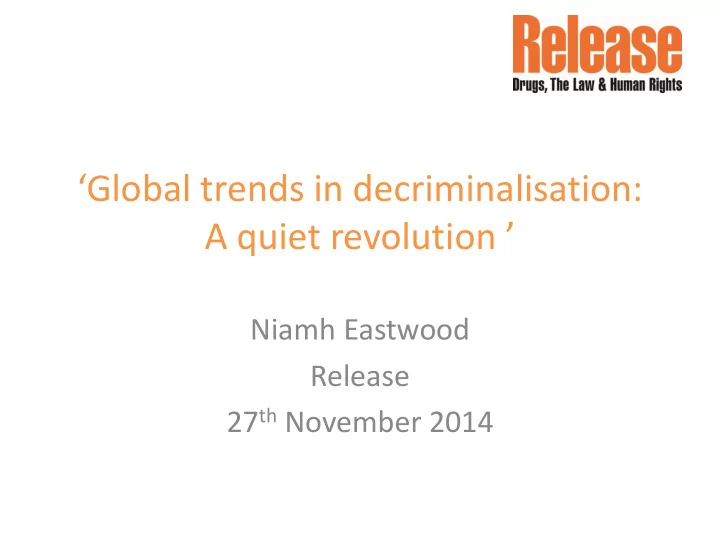

‘Global trends in decriminalisation: A quiet revolution ’ Niamh Eastwood Release 27 th November 2014
Definition of decriminalisation • No criminal record • Included ‘de jure’ and ‘de facto’ models • ‘de jure’ schemes included any type of legislative process that decriminalised possession including discretionary schemes • Ignored escalated approaches e.g UK • Included states where only cannabis decriminalised
Orange = states have decriminalised some cannabis offences Green = possession deemed unconstitutional - no statutory response. Yellow= statutory decriminalisation of drug possession Purple – de facto decriminalisation Blue – de-penalisation
Positive examples of decriminalisation (1) • Portugal introduction of decriminalisation of all drugs in 2001 & investment in public health led to: – Decrease in use amongst vulnerable groups including problematic users and young people; – Reductions in the number of young people becoming dependent on harder drugs such as heroin. – The estimated numbers of injecting drug users in Portugal also decreased by over 40 per cent during that period. – Increases in the number of drug-dependent individuals in treatment. – Significant reductions in transmission of HIV and tuberculosis. – Significant decrease in the number of drug-related deaths and the increased investment in harm-reduction services. – Reduced number of criminal drug offences from approximately 14,000 per year to an average of 5,000 to 5,500 per year after decriminalisation & reduced prison population – Reduced burden on criminal justice system allowing police to focus on more serious crime – Improved relationship between the community and police.
Positive examples of decriminalisation (2) • Czech Republic – 2002 Cost benefit Analysis of criminal justice approach: 1. Penalisation of drug use had not affected the availability of illicit drugs; 2. There was an increase in the levels of drug use within the country; 3. The social costs of illicit drug use increased significantly.
Positive examples of decriminalisation (3) • Australia (4 states have decriminalised cannabis possession) & have shown a capacity to keep individuals out of the criminal justice system. A comparative study showed individuals who were given criminal penalties suffered: – Negative employment, relationship and accommodation consequences – Increased likelihood of further contact with criminal justice system
Positive examples of decriminalisation (4) • USA – 18 states have decriminalised possession of cannabis – No significant difference in cannabis prevalence amongst states – Economic savings: CA introduced cannabis decriminalisation in 1976, in the first six months of implementation enforcement savings of $12.6 million.
Implementation Problems • Threshold quantity to determine personal possession • The role of the decision maker • Sanctions
Recommended Model of Decriminalisation • Threshold amounts should reflect realistic assessment of consumption rates for a specific drug & include problematic use. Should not be determinative factor. • Police should determines offence as dealt with expediently and diverting the person away from the criminal justice system as soon as possible. • Sanctions – comprehensive response but no action against those caught for the first time within a prescribed period
Why decriminalisation of drug possession? • Reduces immediate harms for people who use drugs – Criminalisation – Stigmatisation – Barriers to integration • Hypocrisy of the policy
Incremental Change • Decriminalisation is part of an incremental reform process: – Netherlands – Spain – Czech Republic – Washington & Colorado – Alaska, Oregon & Washington DC – Uruguay
Recommend
More recommend